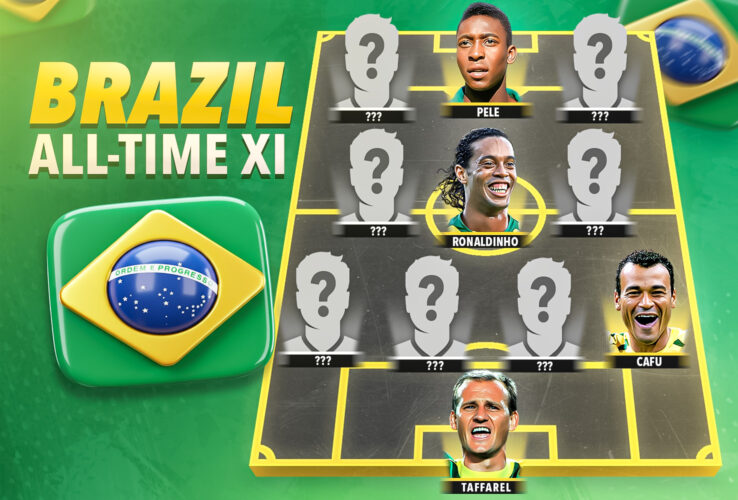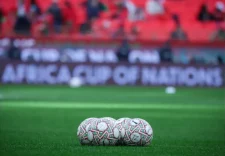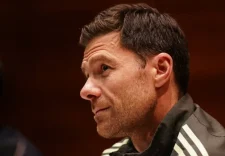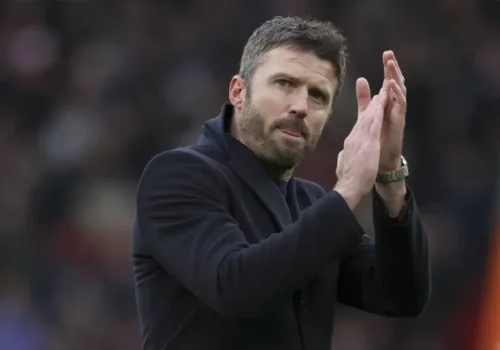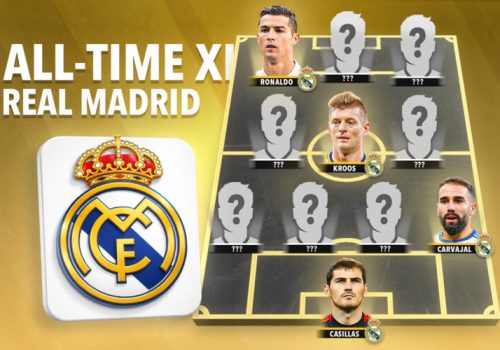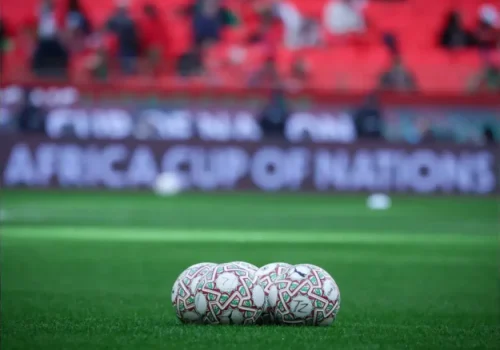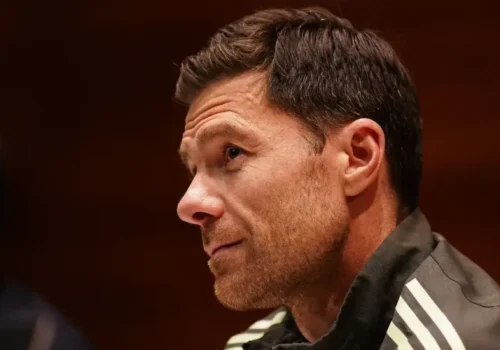No nation has had quite as much impact on world football as Brazil.
Five World Cups, nine Copa America trophies and countless era-defining icons.
Choosing an all-time Brazilian XI is no mean feat. In true Seleção style, we’re going all-out attack with our XI.
Goalkeeper: Cláudio Taffarel
Amongst the hardest positions to pick from – Brazil have been blessed with incredible goalkeepers over the years. Gilmar, Dida and Júlio César were all worthy candidates, but we’re going for Cláudio Taffarel.
Taffarel was Brazil’s number one from the late 1980s through to 1998, playing 101 games and appearing at three separate World Cup tournaments. His finest moment came at USA 1994, when his penalty heroics helped secure Brazil’s fourth title.
At club level, he impressed in Europe with Galatasaray and Parma, showing the same consistency and composure that made him a fan favourite back home.
Right-Back: Cafu
No Brazilian has ever worn the famous yellow shirt more often than Cafu, who made 142 appearances and played in three successive World Cup tournaments.
Cafu was a well-rounded right-back who combined defensive ability with attacking intent. He was the complete full-back and this versatility was a massive tactical strength to the Brazilian teams of the 90s and 00s.
Dani Alves was another incredible Brazilian right-back, but Cafu’s stronger defensive attributes earned him a place in this XI.
Centre-Back: Carlos Alberto
Alberto’s goal in the 1970 World Cup final is remembered as one of the greatest ever scored; his smart finish capped off a fantastic team passing move that tore the Italian midfield and defence apart.
But he was far more than just one moment. Carlos Alberto was a composed centre-back who captained one of the best teams to ever play the game. With his calm authority and intelligent positioning, he helped define what a Brazilian defender could be – stylish yet effective.
Centre-Back: Thiago Silva
Few modern defenders can match Thiago Silva, both in terms of the exceptional levels at his peak and his longevity at the top.
A mainstay of the national team for over a decade, he’s worn the armband across multiple World Cups and Copa Américas. While Brazil’s defence has often been questioned in these tournaments, Silva has remained the constant. Silva is neither the quickest nor tallest centre-back, yet his elite reading of the game means he was rarely beaten.
Left-Back: Marcelo
Marcelo was the definition of a modern full-back – a playmaker from the back who not only controlled the tempo but stretched oppositions with overlapping runs.
When Roberto Carlos retired, many thought Brazil and Real Madrid would struggle to replace a left-back of that calibre and playstyle. Marcelo proved them wrong.
The debate between the two will always divide opinion – Carlos had the power and set-piece brilliance, but Marcelo’s all-round technical ability gets him the nod.
Midfielder: Zico
Despite never winning a World Cup, Zico is fondly remembered amongst the Brazilian greats of the late 70s and early 80s. In 1999, he placed 7th in the FIFA Player of the Century vote.
The great Pelé said “throughout the years, the one player that came closest to me was Zico” – high praise indeed.
Zico was a classic number 10; linking the midfield with the attack whilst chipping in with regular goal contributions. With 48 goals in 71 appearances, Zico is the fifth highest goalscorer for Brazil.
Midfielder: Rivaldo
Predominantly an attacking midfielder, Rivaldo also found success when deployed as either a second striker or left winger.
Between 1993 and 2003, he became a vital part of Brazil’s attack, scoring key goals on the way to their 2002 World Cup triumph. His ability to strike a ball from distance and create a moment of magic out of nothing made him almost impossible to defend against. Rivaldo’s late runs into the box were a source of regular goals, as he was often able to find and exploit the smallest pockets of space.
Midfielder: Ronaldinho
The legendary Ronaldinho completes this rather attacking midfield trio.
At his peak, Ronaldinho played the game like it was pure art. Every touch, flick and pass carried the kind of flair that only a Brazilian could produce. What set Ronaldinho apart from other skillful players was his effectiveness in front of goal; he was far more than just a showreel of flicks and tricks. Of his 33 goals for Brazil, two came in the 2002 World Cup on the way to lifting the trophy.
Forward: Pelé
The undisputed king of Brazilian football – Pelé remains the standard by which all others are judged. A three-time World Cup winner and scorer of over 1,000 goals, he redefined what it meant to be a global superstar.
For Brazil, his record speaks for itself – 77 goals in 92 matches, including decisive performances in 1958, 1962 and 1970.
Forward: Ronaldo
O Fenômeno was the perfect striker; lightning quick, clinical and technically flawless.
For Brazil, he delivered when it mattered most – from his breakout in 1998 to his redemption in 2002 where his eight goals powered the Seleção to their fifth World Cup.
Injuries cut short his prime, but at his peak, there simply hasn’t been a striker quite like Ronaldo Nazário.
Forward: Neymar
Neymar became Brazil’s modern talisman.
He carried the weight of the nation through a relatively unsuccessful period – one Confederations Cup and an Olympic Gold medal is not a trophy haul befitting of Neymar’s legendary national team performances.
Having made his debut as a teenager, Neymar continued into his 30s as Brazil’s primary attacking threat. His longevity at the top helped him surpass Pelé, Ronaldo and Romário to become Brazil’s all-time leading scorer.
Whilst he hasn’t officially retired from national team duty, his last appearance came in 2023 and Brazil appear to be moving on to the next generation. Even if he has no future under Ancelotti, Neymar has secured his position in the historic all-time XI.



